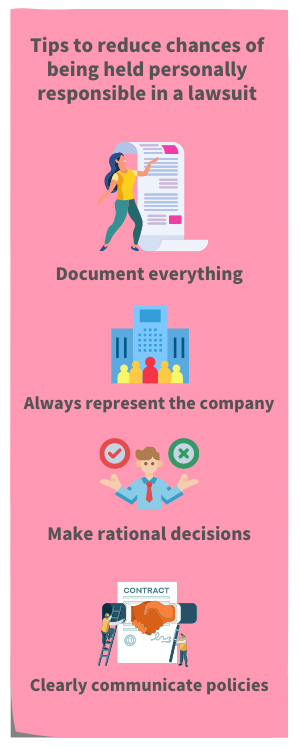6 ways managers can be held personally liable in lawsuits
Who’s legally responsible when an employee files a job-related lawsuit? Sometimes it’s the company. Other times, the manager can be held personally liable for their actions.
These lawsuits are becoming more common. Whether they have merit or not, they are expensive, time-consuming, and damaging to the manager’s reputation and the company as a whole.
Many don’t recognize the possibility of personal liability, so it’s crucial to understand what acts can lead to a lawsuit against an individual instead of the company.
Here’s a little legal context
Many federal laws, such as the Americans with Disabilities Act and the Civil Rights Act of 1964, protect managers from personal liability lawsuits.
However, some laws allow for personal liability, including the:
- Family and Medical Leave Act
- Equal Pay Act
- Consolidated Omnibus Budget Reconciliation Act (COBRA)
- Employee Retirement Income Security Act (ERISA)
- Occupational Safety and Health Act (OSHA)
- Immigration Reform and Control Act
More specifically, managers can be personally liable when they exhibit the following behaviors:
- Intentionally inflicting emotional distress
- Assault and battery
- Withholding overtime pay
- Intentionally interfering with contractual rights
- False imprisonment
- Slander and libel
- Conspiracy to violate legal rights

6 Ways managers can be held liable
To reduce the possibility of a lawsuit against managers, here are six things to avoid in the workplace.
Asking discriminatory interview questions
In this case, someone doesn’t have to be an employee to hold a manager personally liable for their actions. Interview questions can lend themselves to be discriminatory by violating one’s right to privacy. During interviews, you want to ensure you avoid asking inappropriate questions.
Examples of inappropriate questions include:
- Do you have children? How old are your children? Do you plan to have children?
- What’s your sexual orientation?
- Do you have a disability?
- What year did you graduate from high school?
Not all of these questions may seem discriminatory at the onset, and some could come from a relatively innocent place. However, an employee or candidate could bring these up in court as claims of discrimination if they’re not hired or promoted.
Discriminating against employees at work
Whether you’re working in an office or virtually, workplace discrimination is another activity that can lead to a manager being held personally liable for his or her actions. One of the top discriminatory acts is sexual discrimination. An example of sexual discrimination includes choosing not to give an employee a promotion for not taking part in a sexual act.
Firing employees without taking proper steps
Another act to avoid is firing employees without taking the proper steps. Before firing an employee, you want to take the appropriate actions to improve their performance and document your efforts along the way. Otherwise, your firing practices can be deemed discriminatory if the employee is able to present a case that there were other reasons for their dismissal.
Failing to take performance reviews seriously
Courts frequently see performance reviews as evidence in job-related legal claims. Suppose there’s adverse action against an employee, such as being demoted, fired, denied a raise or promotion. Without the proper documentation in a performance review, the argument might be that it was due to discrimination.
To protect yourself against legal claims, be sure to maintain well-documented performance reviews.
An example of this occurring is Lloyd v. Georgia Gulf Corp, in which an employee claims he was fired due to his age. While his employer claimed they fired because of poor performance. Since there was no documentation of poor performance in the employee performance reviews, the court ruled that wasn’t the reason for termination.

Interfering with FMLA claims
If a manager is found to interfere with an employee’s FMLA rights, they can be found liable. Interference can include discrimination against someone going through the process or retaliating against an employee requesting FMLA or an extension of their leave.
Retaliating against OSHA whistleblowers
Suppose an employee shares concerns relating to workplace safety, health, or a myriad of other hazards or violations in the workplace. In that case, there is a program in place to protect them against retaliation — the OSHA Whistleblower Protection Program. If an employer is retaliating against the employee, he can be found personally liable.
Examples of retaliation protected by the OSHA Whistleblower Protection Program include demoting, denying benefits, failing to rehire, intimidating, and reducing pay or hours.
Tips to reduce chances of being held personally responsible in a lawsuit
Managers can avoid liability in a lawsuit by practicing good habits including the following.
Document everything
Consistently document relevant information related to employees. It’s easy for memories to fade and what you remember about an event isn’t always enough to prove your case.
Having written records regarding your decision and rationale for your findings is one of the best forms of protection.
Always represent the company
You want to avoid actions that appear to be you acting on your own instead of on behalf of the company.
That’s why you want to use official company communication methods such as your work email and work phone. Additionally, sign documents with your job title and write letters on company letterhead.
Otherwise, if there’s no proof you made the decision acting as an employee of the company. The backlash from your decision or comments can be your personal responsibility in court.
Make rational decisions
As a company manager, you want to make decisions based on reasons and facts instead of personal emotions or feelings. You can explain and prove reason and facts. However, making decisions because of personal feelings can leave the door open for claims of discriminatory practices.
Also, part of making rational decisions is ensuring your decision is legally sound. Often that means consulting with the legal department or human resources department for additional guidance.
Clearly communicate policies
Clear communication with employees about policies can help to reduce unnecessary lawsuits made against company managers. As long as the guidelines are based on up-to-date laws and regulations, having open communication about the policies can diffuse difficult situations in the workplace.
Additional Resource: See the top 5 mistakes managers make that lead to lawsuits.






